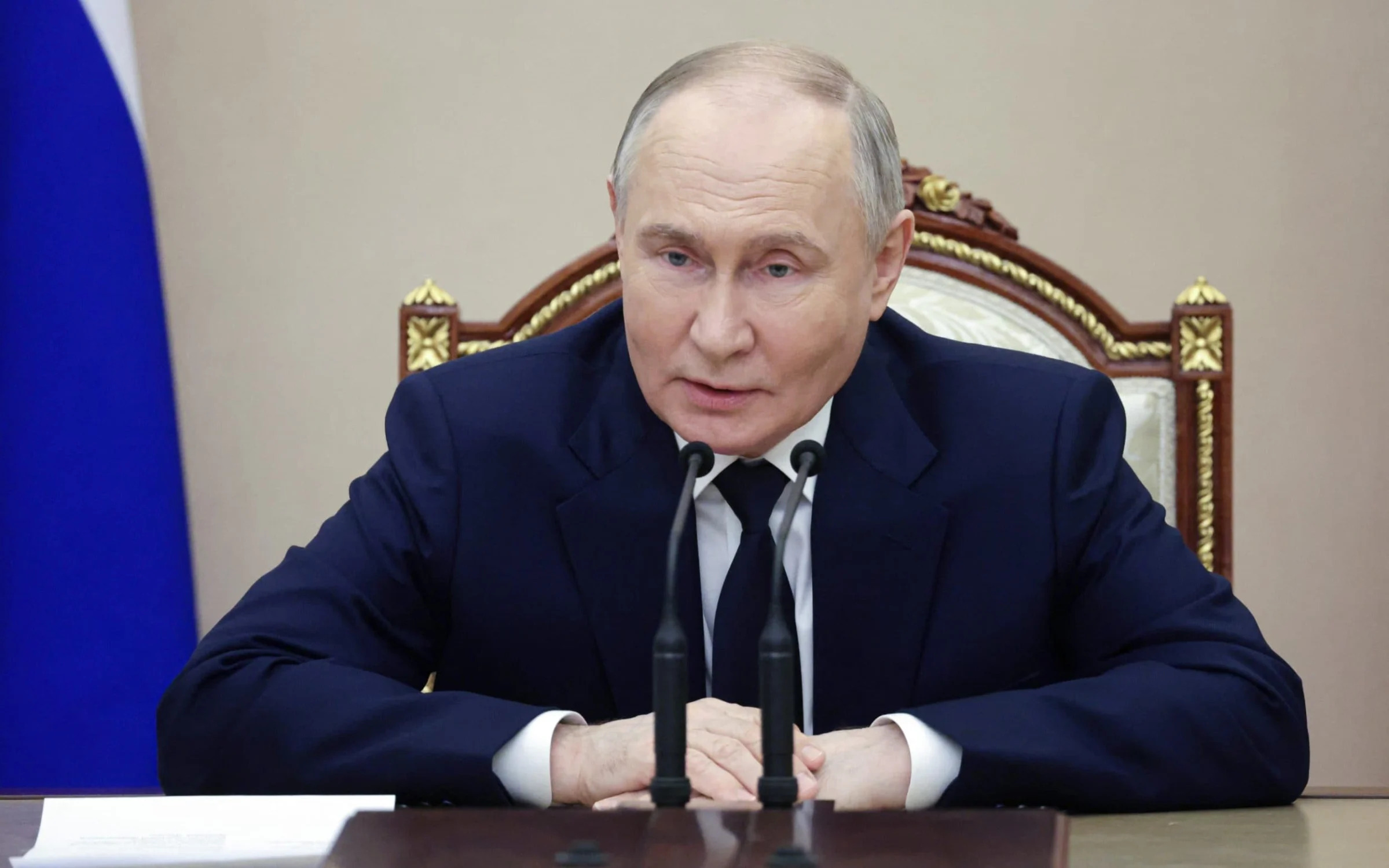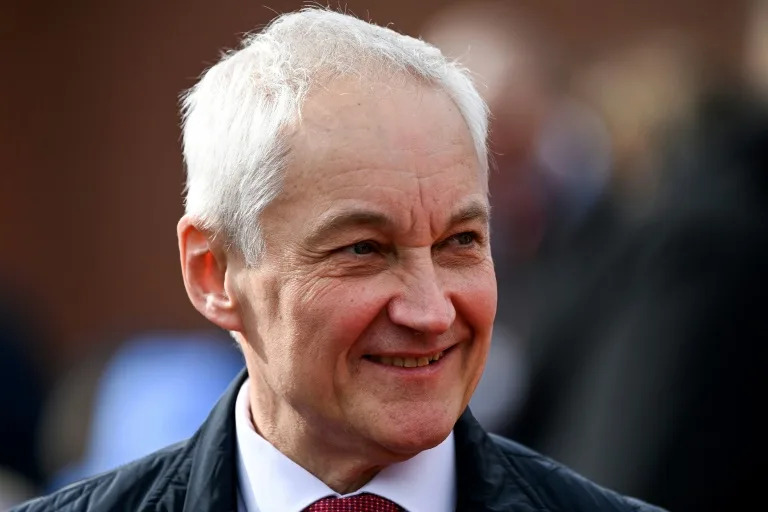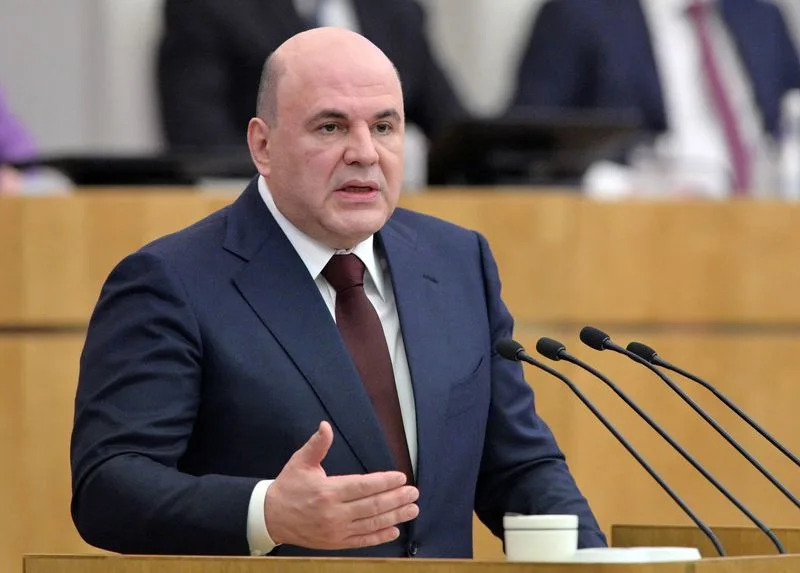Putin could now defeat Ukraine within months

Vladimir Putin.
The Prime Minister, in his “state of the nation” speech this week, accurately stated that the world is a very dangerous place, and we must ensure that our defence capabilities are up to the task. He is right on the threat but has yet to grasp that one way to meet it is by investing heavily in our physical and psychological military conventional deterrence.
The signs coming out of Moscow are far from encouraging, with Putin sacking his combat generals to replace them with “bean counters”. Presumably to ensure the economy is on a total war footing and capable of taking on Nato and outlasting it on the battlefields and in the parliaments of Europe. If Trump comes to power, he may only need to hold tight until January 2025; not long.
At the same moment, Russia appears to be making significant gains towards the second city Kharkiv, possibly catching the defenders on the hop and no doubt trying to unbalance the Ukraine army before the US heavy weaponry and the F16s arrive in numbers. The Ukraine Security Service believes that Russian forces are also massing in the northeast for another strike into Ukraine. In the worst case scenario, Russia could make significant gains this summer and terminally unsettle Ukraine’s defence. The fact that Volodymyr Zelensky has just cancelled visits to Spain and Portugal underwrites the seriousness of the current situation for those Western leaders not paying attention.
The US and Nato’s indecision and procrastination have helped strengthen Putin and given him the confidence to go on the offensive. Putin appears undeterred by Western leadership, believing many of our politicians are not up to the fight. Yet few who study this conflict believe Putin will stop at Ukraine: in order to prevent a major escalation between Russia and Nato, therefore, Ukraine must prevail. That will only happen with Nato’s indirect and direct support now.
Nato must plan for the worst-case scenario, where Russia breaks the “line” and charges West at speed and must be blocked. Much better to block in Ukraine than on Nato soil, but this may require Nato “boots in the air and on the ground”, or as a minimum the genuine threat of such action. Too many Western leaders have ruled this out, which has only emboldened Putin; here, President Macon is right. They must now rule it “in” to change Putin’s thinking and approach. We must also plan to knock down Russian missiles and drones attacking Ukrainian cities as we did those Iranian ones attacking Israeli cities.
Get AfriPrime Android Web View app....Click the link to Amazon app store to download https://rb.gy/3xek46
Putin has done nothing to conceal his objectives. Yet, as he turns tractor factories into tank production lines, the West is more concerned about climate change, wokism and elections. None of which will prevent another world war. We are grudgingly, eventually, planning to spend 2.5 per cent of GDP on defence – yet and Russia is spending north of 6 per cent. This war has shown us yet again that mass really matters, and this we do not have, but Russia does in spades.
Most people in the UK, and probably the rest of Europe, do not believe war with Russia is a realistic possibility; our forebears thought the same in 1939. Had we not given up our defensive deterrence after World War I, Hitler would not have been so emboldened to attack, but we are gifting Putin the same advantage.
If politicians get this wrong now, their elections later in the year may be meaningless, as we all head to the recruitment centres rather than the polling stations. If they get this wrong, everything else vexing us today could become horrifically irrelevant tomorrow.
Get AfriPrime Android Web View app....Click the link to Amazon app store to download https://rb.gy/3xek46
Russia must beat Ukraine with 'minimal losses': new defence chief
Economist Andrei Belousov will replace Sergei Shoigu as Moscow's defence chief.
Russia's new defence minister on Tuesday said that Moscow's priority was to secure victory on the battlefield against Ukraine while minimising human losses.
President Vladimir Putin on Sunday nominated economist Andrei Belousov to replace Sergei Shoigu as Moscow's defence chief, a surprise move more than two years into a conflict that Russia hoped would be wrapped up in a matter of days.
"The key task, of course, remains achieving victory and ensuring that the military-political goals of the special military operation, set by the president, are achieved. In this respect, I want to especially emphasise: with minimal human losses," Belousov told a session of Russian lawmakers on Tuesday.
Moscow rarely talks about the losses it has sustained through the conflict, which it still calls a "special military operation".
It last gave an official figure in September 2022, when it said 5,937 soldiers had been killed in combat.
But several independent analyses and assessments by Western intelligence services put Russian deaths well into the tens of thousands.
The BBC and the independent Mediazona outlet say they have verified the deaths of at least 50,000 Russian soldiers through tracking official local reports and announcements of soldiers' deaths in local newspapers, by regional officials and on social media pages.
Ukraine's General Staff on Monday said it had inflicted a record number of losses on Russian forces over the last 24 hours after Moscow launched a major new ground assault on the northeastern Kharkiv region.
Ukrainian President Volodymyr Zelensky said in February that around 31,000 Ukrainian soldiers had been killed in the first two years of the conflict.
AFP is unable to verify those figures.
Following confirmation hearings in Russia's rubber-stamp parliament, Putin signed a decree on Tuesday confirming Belousov as the country's new defence chief.
Belousov also said that Moscow was not discussing a new wave of mobilisation, "or some kind of emergency measures" to boost troop numbers.
Russia has a manpower advantage over Ukraine on the battlefield.
The Kremlin has indicated Belousov, an economist with no military background, will not be involved in making operational decisions over the campaign, which will be the remit of the army's General Staff.
Get AfriPrime Android Web View app....Click the link to Amazon app store to download https://rb.gy/3xek46
- From security to shipbuilding -
Separately on Tuesday, Putin appointed his powerful ally Nikolai Patrushev as his aide responsible for shipbuilding -- an apparent demotion from his previous role as Security Council secretary.
Patrushev, 72, is a shadowy but influential figure. Like Putin, he has a background in the intelligence agencies and is one of the regime's most strident anti-West hawks.
Kremlin spokesman Dmitry Peskov acknowledged that Patrushev's new role in charge of shipbuilding was work "of a different nature".
"But this is an absolutely strategic sector -- huge, very complex," he added during a briefing with reporters.
Although an apparent step down, the role brings Patrushev into the presidential administration and ensures he will maintain direct contact with Putin.
Outgoing defence chief Shoigu will replace him at the Security Council.
Girding Russia for war, Putin gives extra duties to two top officials
Russian Prime Minister Mishustin attends parliament session in Moscow
Russian President Vladimir Putin on Saturday gave extra duties to two key government officials who oversee the defence industry and energy sectors, as the Kremlin chief girds the world's second-largest oil exporter for a longer war in Ukraine.
Putin, who rose to power just eight years after the Soviet Union crumbled in 1991, proposed extra powers for Denis Manturov, 55, the only first deputy prime minister in the new government of Prime Minister Mikhail Mishustin.
Putin's energy point man, Alexander Novak, 52, will remain as deputy prime minister overseeing energy but will get additional duties for running the economy, according to the government.
Manturov oversees the Russian defence and civilian industry, which has surprised the United States and its European allies by ramping up artillery production faster than the whole of the NATO military alliance combined despite sanctions.
"The increase in the status of the deputy prime minister in charge of industry is due to the importance of ensuring technological leadership," the Russian government said.
Russia said it aspired to "technological leadership in all areas," such as aircraft manufacturing, machine tool building, radio electronics and the military-industrial complex.
Novak has implemented Russia's key relationship with the Organization of the Petroleum Exporting Countries.
Get AfriPrime Android Web View app....Click the link to Amazon app store to download https://rb.gy/3xek46
MANAGERIAL EXPERIENCE
"Novak has the necessary managerial experience," the government said. "For a long time, he coordinated economic and financial issues in various positions, both in business and in municipal and public service."
The proposals, formally made by Mishustin, have to be confirmed by the lower house of parliament.
Dmitry Patrushev, formerly agriculture minister, will become a deputy prime minister overseeing the agricultural sector. Oksana Lut will become agriculture minister.
Putin left Finance Minister Anton Siluanov and Economy Minister Maxim Reshetnikov in their jobs, but proposed Sergei Tsivilev, governor of Kemerovo region, as energy minister instead of Nikolai Shulginov. Anton Alikhanov, the 37-year-old governor of Kaliningrad, was proposed as trade and industry minister.
Putin's 2022 invasion of Ukraine has touched off the worst fall-out in relations between Russia and the West since the 1962 Cuban Missile Crisis, according to Russian and U.S. diplomats.
The West casts the invasion as an imperial-style land grab and has vowed to help Ukraine defeat Russian forces. Putin casts the war as a battle with the West which he says tried to encroach on Russia's sphere of influence, which he considers to include Ukraine.
Russia controls 18% of Ukraine. Its economy has grown despite the West's sanctions and Russian forces are advancing in Ukraine despite hundreds of billions of dollars in Western support for Ukraine.
Russia has repeatedly warned that Western support for Ukraine - including Western weapons that have been used to hit Russian territory - risks escalating the conflict into a broader European war, and says it will achieve all of its aims in Ukraine.
Other major appointments, such as proposals for the defence, foreign and key security services, are likely to come on Monday.
Putin signs decree naming new Russian government, including replacement of defense minister
Russian President Vladimir Putin on Tuesday signed a decree appointing a new government, including replacement of the defense minister with a former deputy prime minister who is an economics expert with no military background.
When Putin was inaugurated for a new six-year term on May 7, the government submitted its resignation in line with Russian law. Putin reappointed Mikhail Mishustin as prime minister three days later, which was quickly approved by the lower house of parliament.
On Sunday, he signed a decree moving Sergei Shoigu from his post as defense minister to head of the national security council. Putin also nominated deputy prime minister Andrei Belousov to take Shoigu's place.
Putin also proposed names for some Cabinet members to return to their posts and Mishustin submitted names for several new ministers, all of which were approved by the parliament.
Shoigu has been widely seen as a key figure in Putin’s decision to send Russian troops into Ukraine. Russia had expected the operation to quickly overwhelm Ukraine’s much smaller and less-equipped army and for Ukrainians to broadly welcome Russian troops.
Get AfriPrime Android Web View app....Click the link to Amazon app store to download https://rb.gy/3xek46
Instead, the conflict galvanized Ukraine to mount an intense defense, dealing the Russian army humiliating blows, including the retreat from an attempt to take the capital, Kyiv, and a counteroffensive that drove Moscow’s forces out of the Kharkiv region.
Shoigu also was shadowed by the arrest last month of deputy defense minister Timur Ivanov on charges of accepting huge bribes.
The decree by Putin largely retains the previous Cabinet, but names new energy, sports, transport, industry and agriculture ministers.
- Questions and Answers
- Opinion
- Story/Motivational/Inspiring
- Technology
- Art
- Causes
- Crafts
- Dance
- Drinks
- Film/Movie
- Fitness
- Food
- Games
- Gardening
- Health
- Home
- Literature
- Music
- Networking
- Other
- Party
- Religion
- Shopping
- Sports
- Theater
- Wellness
- News
- Culture
- War machines and policy




